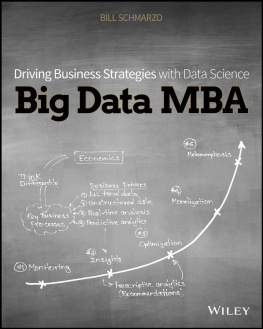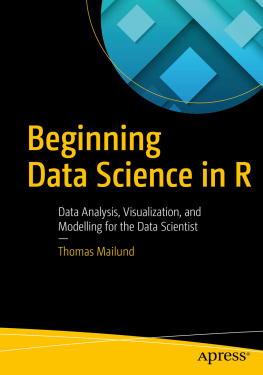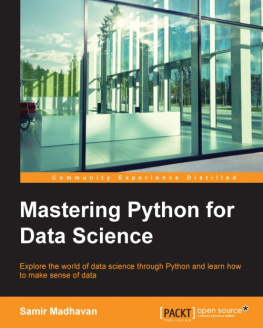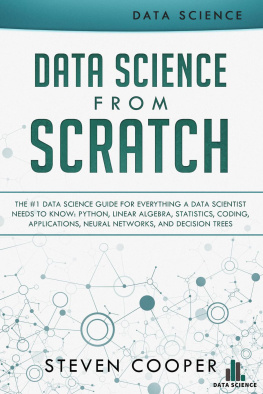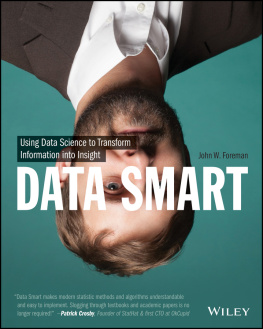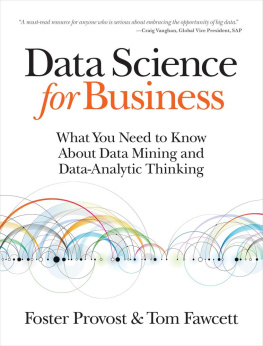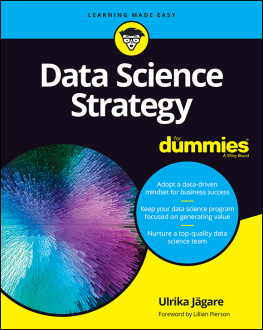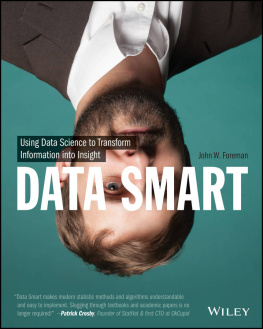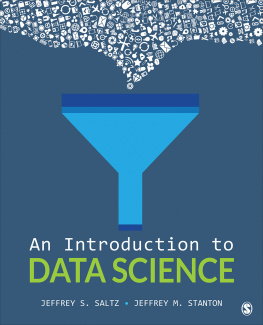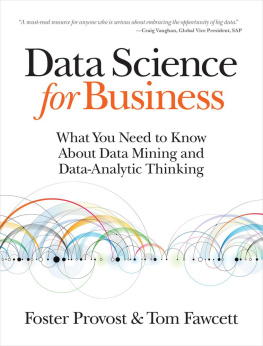Roman's Data Science
How to monetize your data
Roman Zykov
Copyright 2021 Roman Zykov
All rights reserved
No part of this book may be reproduced, or stored in a retrieval system, or transmitted in any form or by any means, electronic, mechanical, photocopying, recording, or otherwise, without express written permission of the publisher.
Cover design & illustrations: Vladimir Vishvanuk
Russian editor: Ekaterina Zykova
Translation to English: Alexander Alexandrov
English editor: Philip Taylor
Preface to the English edition
This book first hit the shelves in Russia on April 26, 2021 and was the culmination of more than a year of hard work. The initial run sold out in just three weeks, becoming a bestseller! This inspired me to have the book translated into English and publish it on Amazon.com.
I would like to think that my experience in data analysis will be of interest to readers outside of Russia. To help you understand this book better, I will describe here some of the Russian companies that I refer to in the text. These are Ozon.ru, Wikimart.ru and RetailRocket.ru.
Ozon.ru is one of the first e-commerce companies in Russia, sometimes referred to as the Amazon of Russia. The company was established in 1998, and by 2019 it was among the top three online retailers in the country. In 2020, Forbes ranked Ozon the third most valuable Russian internet company.
Wikimart.ru is an online B2C marketplace that enables Russian retailers to sell a wide range of products, from electronics to apparel. The company closed in 2016.
Retailrocket.ru offers online shopping recommendation services based on user behaviour. I founded the company in 2012 alongside two of my partners. The company has proved to be extremely successful, with offices in Russia, Western Europe and South American providing services for over 1000 clients. I left Retailrocket.ru in 2021.
The book was translated into English by RPK Group . RPKs translators, Philip Taylor and Alexander Alexandrov, helped me get my messages across and make the book read as an authentic English text.
Introduction
Give me a place to stand, and I will move the earth.
Archimedes
Give me data, and I will change your whole life.
Data Scientist Archimedes
Data is everywhere from Tinder algorithms that match you with supposedly (but not really) random people, to information wars waged by politicians. It is of no surprise to anyone these days that every single thing we do is closely monitored, including your internet search history and whatever you might be up to offline too. Something catch your eye when you were passing that sports store? Just wait for the ads to start appearing on you social network pages. Tell a friend at work what your cats been up to and suddenly theres dry kibble and cat litter all over your feed.
This is where the more impressionable of us might become more than just a little paranoid. But its not the data thats to blame. Its all about whose hands it falls into. There are many myths when it comes to data analysis, and data scientist is one of the sexiest and most promising professions of the future. My aim with this book is to debunk these myths and tell things how they really are. And I hope that you, the reader, will find yourself on the light side of the Force alongside me.
I graduated from the Moscow Institute of Physics and Technology in the early noughties before going on to head up the analytical department of the online store Ozon.ru, where I created analytical systems from scratch. I have provided consulting services to investment funds and retail and game industry giants. Eight years ago, I co-founded RetailRocket.ru, a marketing platform for online stores. During that time, we have become the undisputed market leader in Russia and have expanded our operations to Chile, the Netherlands, Spain and Germany. In 2016, I gave a guest lecture on hypothesis testing at MIT in Boston, and in 2020, I was nominated for the CDO Award.
They say it takes 10,000 hours of practice to become a master in ones field. Ive been doing data analysis since 2002, when it wasnt such a hot and talked-about profession. Have I clocked in those all-important 10,000 hours? Well, lets do the maths: 10,000 hours / 4 hours a day / 200 days a year = 12.5 years. Looks like Ive actually posted one and a half times this figure! I hope this is enough to have produced a book that the reader will find useful.
This book is about how to turn data into products and solutions. It is not based on academic knowledge, but on my personal experience of data analysis over the past 20 years or so. There is no shortage of courses on data science and machine learning these days, but, as a rule, they are highly specialized. This book is different in that it does not bog the reader down with unnecessary details. Rather, it provides a big picture perspective, offering insight into:
Table of contents
Who is This Book For?
This book is dedicated to thinking readers who want to try their hand at data analysis and develop data-driven services.
If you are an investor, this book will help you to better understand the potential and infrastructure of the startup team asking you for your investment.
If you are itching to get your startup off the ground, this book will help you find the right partners and hire the right team from the outset.
If you are starting your career, this book will broaden your horizons and help you start applying approaches that you may not have considered.
How to Read this Book
The beauty of this book is that it does not need to be read in order. The following is a short description of each chapter:
Chapter 1. "How We Make Decisions" describes the general principles of decision-making and how data affects decisions.
Chapter 2. "Lets Do Some Data Analysis" introduces general concepts: What artifacts do we deal with when analysing data? In this chapter, I also start to raise some organization issues relating to data analysis.
Chapter 3. "Building Analytics from Scratch" describes the process of building analytics, from the first tasks to the choice of technology and hiring personnel.
Chapter 4. "How about Some Analytical Tasks?" This chapter is all about tasks. What is a good analytical task? And how can we test it? The technical attributes of such tasks are datasets, descriptive statistics, graphs, pair analysis and technical debt.
Chapter 5. "Data" covers everything you ever wanted to know about data volume, access, quality and formats.
Chapter 6. "Data Warehouses" explains why we need data warehouses and what kind of data warehouses exist. The chapter also touches upon the popular Big Data systems Hadoop and Spark.
Chapter 7. "Data Analysis Tools" describes the most popular analytical methods, from Excel spreadsheets to cloud systems.
Chapter 8. "Machine Learning Algorithms" provides a basic introduction to machine learning.
Chapter 9. "The Practice of Machine Learning" shares life hacks on how to study machine learning and how to work with it for it to be useful.
Chapter 10. "Implementing ML in Real Life: Hypotheses and Experiments" describes three types of statistical analysis of experiments (Fisher statistics, Bayesian statistics and bootstrapping) and the use of A/B tests in practice.



